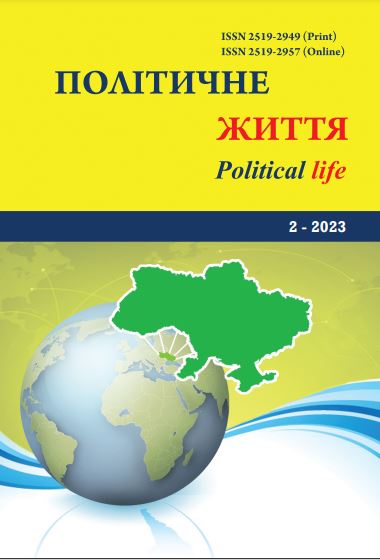Security imperatives of the ukrainian informational space in conditions of the hybrid warfare
DOI:
https://doi.org/10.31558/2519-2949.2023.2.11Keywords:
informational space; informational warfare; hybrid war; propaganda; extremism; terrorismAbstract
The essence of the "hybrid war" is clarified, as a full arsenal of various types of combat operations (bombing of civilian infrastructure, terrorism, disorderly, brutal, unprovoked violence), as well as informational and psychological pressure on citizens of one’s own country and on citizens of the country - occupations involving state and non-state actors.
Mechanism of providing informational security of Ukraine is analyzed, it’s efficiency as some system of connected by itself parts from the content of which - from the normative and institutional base of the content - to the inter-sectoral interaction of information security subjects, the implementation of a free state course in the information sphere depends.
It has been shown that russian approach to the informational warfare – it is global strategy which includes cyber attacks and also informational operations against most of the democratic actors in the world, that russian campaign of the informational warfare continue to discredit democratic institutions, promoting extremism and discontent, supporting anti-democratic leaders, trying to shake the influence of the West.
Russian information strategies, using a wide range of disinformation tools, "troll factories", etc., were found to be aimed at restoring Russian dominance in the post-Soviet/imperial sphere of influence; reducing the influence of Western democratic values, institutions and systems in order to create a polycentric world model; the expansion of Russia’s political, economic and military hegemony throughout the world.
References
Hoffman, Frank G. (2011). Threats and Strategis Thinking. Infinity Journal, 4, p.17.
Putin’s hybrid war [Electronic resource]. Access mode:http://kne/com.ua/9-glavayi-razdel/1235-gibridnaya-vojna-putina.html.
Magda, E. (2017). Russia’s Hybrid Aggression: Lessons for Europe. Kyiv: KALAMAR, 2017, 268 p. (in Ukrainian).
Polevy, T.E. & Yuskiv, H.V. (2021). Russian propaganda as a tool of «hybrid aggression». Case of Belarusians. Political life, 3, p. 86-95 (in Ukrainian).
Vlasyuk, O.V. (2016). Hybrid war and its «hybrid fighters» in Ukraine: moral and political aspect Instead of conclusions / Vlasyuk O.S. National security of Ukraine: evolution of domestic policy problems: Elected Works. Kyiv: NISD, 528 p. (in Ukrainian).
Vlasyuk, O. (2016). Humanitarian, information and economic consequences of the war in the East of Ukraine for the European security space. Regional stability on the borders of Ukraine and the EU: modern challenges and support tools. Kyiv: NISD, p. 19-26 (in Ukrainian).
SACEUR: Allies must prepare for Russia hybrid war [Electronic resource]. Access mode: http // www.stripes.com/news/saceur-fllies-must-prepare-for-russia-war-1.301464.
Vlasyuk, O.S. (2015). Ukraine and Europe are natural allies in countering Russian informational aggression. Ukrinform. Blogs. July 28 [Electronic resource]. Access mode: http://blogs.ukrinform.gov.ua/blog/oleksandr-vlasyuk/ukrayina-i-yevropa-pryrodni-soyuznykyu-protydiyi-rosiyskiy-informaciyniy-agresiyi (in Ukrainian).
Naichuk, A.V. & Markitantov V.Yu. (2022). Key factors of the security situation in Eastern Europe and threats to the state interests of Ukraine. Political science bulletin: a collection of scientific papers. Kyiv: Vadex LLC, Issue 88, р. 175-188.
Horbulin, V. (2014). «Hybrid war» as a key tool of the Russian geostrategy of revenge. Strategic Priorities, 4 (33), p. 5-12. (in Ukrainian).
Batrymenko, O.V. (2022). The role of social media in the Russian-Ukrainian information war. Political science bulletin: a collection of scientific papers. Kyiv: Vadex LLC, Issue 89, р. 124-132.
Zakon3.rada.gov.ua/lavs/show/287/2015.
Https://fiu.gov.ua/pages/zakonodavstvo/392/2020/

